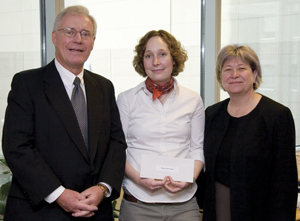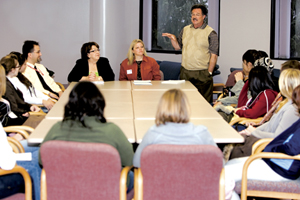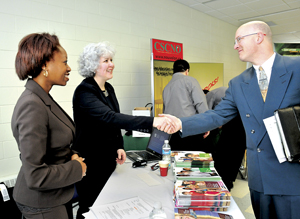|
|
teacher Status in EnglandCambridge study highlights dedicationA four-year study of teachers in England has concluded that they are more strongly influenced by a sense of vocation and the ability to help their students than they are by concerns about their status. The Cambridge University Faculty of Education conducted the Teacher Status Project from 2003 to 2006 by surveying teachers and those in close contact with them and by researching media coverage. The study was precipitated by concerns about teacher recruitment and retention when a 2002 survey by the General Teaching Council for England – the Ontario College of Teachers’ English counterpart – found that one-third of teachers reported they would be leaving the profession within five years. The teachers’ status study found that about one-half the general public between 2003 and 2006 considered teaching to be an attractive career, although there were substantial differences in how pay levels – a basic indicator of status – were viewed. While just one in five members of the public initially surveyed thought that pay levels made teaching an attractive career, responses by the end of the survey indicated that nearly 80 per cent thought pay was a positive feature. Having to control a class was considered to be one of the leading unattractive features of teaching. During the period of the study, media representation of teachers became more sympathetic and positive, contradicting the profession’s common misperception of a hostile press. Teachers and associated groups – assistants, trustees, parents and others in close contact with teachers – say that teachers’ status has declined during the past four decades, although the low perception levels of 2003 had recovered somewhat by 2006. The study found that teachers were not overly concerned with how they were perceived by those outside the profession, but felt best about their status when they believed themselves to be trusted, appreciated and rewarded by parents and through collaborative work with other professionals. Classifying schools as high-achieving or low-performing resulted in differences in how schools were perceived and the resources they received, which had an impact on how teachers felt about their status. Teachers working in high-achieving schools reported feeling a higher level of status than did those working in low-performing schools. Subgroups of teachers, such as those belonging to ethnic minorities, supply teachers, early-years and special-needs teachers, reported feeling a degree of marginalization within the profession, which contributed to a lower sense of status. Only those teachers involved in continuing professional development and research emerged with a higher sense of status and esteem. The purpose of the study was to establish a baseline in order to monitor changes in perceptions of teachers’ status and identify how those perceptions can be raised. The study report acknowledges that problems of recruitment and retention have eased, but notes that there is still an increasing demand for teachers in particular regions and particular subjects, and for particular subgroups of teachers, such as those from ethnic minorities. The project report outlines government policy changes that may affect teacher and public perceptions of the profession’s status, but concludes it is too early to know what the effects will be. The project description, background and final report can be accessed online. Scholarship winner
Mentoring opportunityNew program focuses on Spanish speakersThe Centre for Spanish Speaking Peoples in Toronto is launching a new tutoring and mentorship program aimed at high school youth from Spanish-speaking countries. “We are hoping to create a culturally sensitive support system for Hispanic youth who are struggling in our schools,” says Cecilia Alejo Rivas, a youth counsellor at the centre. “The need for positive role models for Hispanic youth is great and we want to work with teachers from Spanish-speaking countries to provide mentoring and tutoring.” The centre is inviting teachers from Spanish-speaking countries to get involved in this community-based program. If you or someone you know would like to get involved, contact Cecilia Alejo Rivas, Centre for Spanish Speaking Peoples, 416-533-8545. Aboriginal instituteDigital StorytellingThe beat of drums resounded through the College Council chamber as a two-day Aboriginal institute, hosted by the Standards of Practice and Education Unit, drew to a close on January 8. The event, facilitated by College member Peter Brodribb and College staff, was attended by educators who live and teach in Aboriginal communities in Kenora, Thunder Bay, Walpole Island, Sioux Lookout, Red Lake and Wallaceburg. It focused on the power of digital storytelling and the pivotal role of the ethical standards and standards of practice. Participants brought their unique perspectives, sense of humour, trust, respect and deep understanding of their culture. Each also brought artifacts – such as student drawings, moccasins, a guide’s sash, a ceremonial drum and a recently recorded CD – that held memories related to their own teaching experience. These objects seeded the stories they told of their backgrounds and experiences as Aboriginal educators. The Standards of Practice and Accreditation Department is currently involved in revising guidelines for current Additional Qualifications (AQs) as well as developing guidelines for new ones. Gatherings such as these help to develop these guidelines. “I and other members of our staff gained many insights over the last two days – about the environment, students’ spiritual growth and the importance of Aboriginal identity,” said Déirdre Smith, Manager of Standards of Practice and Education. Participants expressed great appreciation for the opportunity to share information and experiences with colleagues in other areas of the province. They were also excited and inspired by the possibilities that digital storytelling offers for passing on culture and traditions. As one participant said, “Our stories are important and need to be heard.”
Paul Stone, who teaches at Aamjiwnaang First Nation near Sarnia, was one of 14 participants in the Aboriginal Digital Story Institute held at the College. French-language school boardsThe Franco-Ontarian community celebrates 10 years of control over its own schools this year. Ontario’s 12 French-language school boards were brought into being in January 1998. School boards are marking the occasion with a variety of initiatives – from tributes and other special events to redesigned web sites. Previously, French-language education was, in most cases, managed by French-language divisions within the English-language system. The establishment of francophone boards across the province (eight Catholic and four public) provided their communities with a solid base for preserving and developing the language and culture. It also provided a context for developing culturally specific aspects of curriculum and implementing strategies aimed at improving the quality of education in French. Pressure for changes to governance in Ontario’s French-language schools began in the 1970s. In 1976 the Mayo Report recommended the establishment of a French-language school board. The introduction of the Canadian Charter of Rights and Freedoms in 1982 provided another step in the evolving political context. Without referring to school governance in particular, Section 23 – guaranteeing the right of official-language minorities to be educated in their own language – provided the impetus for the government to turn education governance over to the francophone minority. Aboriginal educationMarking achievements and setting the agendaEach morning, first nations students' voices set a compelling tone for the day’s proceedings at Circle of Light, a two-day conference held in Toronto in November 2007. The conference was attended by more than 500 educators and administrators including representatives of school boards, faculties of education, First Nations organizations and education stakeholders, as well as 19 students.
Educators and representatives from First Nations, Métis and Inuit communities, and organizations from across the province, led more than 50 workshops in which participants discussed issues and shared information, resources and successes. The range of workshop topics and the number of participants in attendance gave evidence that the will to improve opportunities for First Nations students in Ontario is strong. The students, along with keynote speakers Cecil King, Maria Campbell, Pamela Rose Toulouse and Ben Levin, reflected a tone of challenge as well as a recognition that much hard work has already begun and the time to build on that work is here. Francophone Career Fairs
La francophonieSeventeen days of cultural celebration
Though still operating under its original name, the event has in recent years expanded beyond a mere seven days. This year’s “week” is 17 days, running from March 7 to 23. An initiative of the Association canadienne d’éducation de langue française (ACELF), the activities are meant to help develop a dynamic francophone cultural identity among francophone students and educators, as well as a sense of belonging to a worldwide French-speaking community. ACELF has produced a series of possible activities for teachers at all grade levels that can be downloaded from its web site. These will enable students to explore their francophone heritage and discover links between the past and present as they build a dynamic cultural future. Various organizations across Ontario are participating, bringing together people of all ages to celebrate. In Toronto, the Centre francophone is scheduling activities and organizing a large-scale show that will spotlight the Journée internationale de la francophonie on March 20. In the Ottawa region, le Conseil des écoles publiques de l’Est de l’Ontario will honour Grade 9 to 12 students who have proven themselves models for francophone pride. Prizes will be awarded in several categories, including community involvement, social justice, global issues and opinion making. Theatrical and musical performances, storytelling and other events are in the works in Sudbury, while l’Association canadienne-française de l’Ontario du grand Sudbury and the region’s Richelieu clubs plan a celebratory dinner. The homework debateAssumptions, data and practice“Time is the only coin we have to spend – and our children shouldn’t waste theirs doing homework.”
Goodman, a retired English teacher from Calgary, believes homework stresses children and parents, causes friction at home and takes time from activities that are more beneficial to developing children. She claims most students spend between 10 and 20 hours a week doing homework – and that’s far too much. “Schools aim to develop children who are confident, imaginative, strong communicators, critical thinkers and team players,” she argues. “How are these qualities fostered by homework?” She cites The Case Against Homework by Sara Bennett and Nancy Kalish, which says there is almost no evidence that homework boosts elementary students’ academic success and little evidence that it helps older students, and The End of Homework by Etta Kralovec and John Buell, which argues that homework hurts families and has limited educational value.
Brathwaite countered that homework helps students become engaged, successful, independent learners, and suggested that students complete homework with peers, as they do in college and university. He cited the comprehensive study, Does Homework Improve Academic Achievement? A Synthesis of Research, 1987–2003 by Duke University’s Harris Cooper and his colleagues. Examining findings from more than 60 studies, they concluded that limited and focused homework positively affects student achievement, especially after age 11. While generally in favour of homework, some parents at the conference talked about children spending too much time on it most nights. Many complained about spending hours helping children complete projects. One mother insisted that her Grade 1 daughter complete a project by herself and was then devastated when she saw the high-quality work submitted by other children who clearly had adult help. People for Education executive director Annie Kidder pointed out that school boards urge parents to be engaged in their children’s homework, “but that hurts parents who can’t help their children. Besides, why should they be engaged? Shouldn’t the kids be engaged?” Still, adds Kidder, homework is one tangible way parents can see what their children are doing in school. Hot on the heels of this debate, the Toronto DSB published findings of its first-ever survey of 105,000 Grade 7–12 students. The 2006 data shows that Grade 7 and 8 students say they spend about 10 hours per week doing homework, while high school students spend about 12. Both numbers are higher than those recommended by most school boards and homework advocates, which suggest about 10 minutes per grade level, that is, one hour per night for Grade 6 students, two for Grade 12. While the Ministry of Education does not have a formal homework policy, course profiles list homework as a teaching and learning strategy. Elementary and secondary school report cards cite homework completion as a learning skill, and many official documents tell parents how to help children with homework. Faculty Tour
College Chair Don Cattani addresses pre-service students at Nipissing University in North Bay. visitorsDelegations visit the College to share and gather information on a range of education issues, including accreditation, qualifications and standards of practice.
Promoting postsecondaryProgram encourages those who might stop at high schoolHigh school students from Aboriginal, low-income and first-generation families will be the focus of a new initiative that will now actively encourage them to attend college or university, and direct them to available financial support. The YMCA in the Greater Toronto Area is partnering with the Canada Millennium Scholarship Foundation in a scheme that will provide information and advice to students and families from groups that tend not to pursue education beyond high school. Called the Post-Secondary Access Partnership, the program’s goal is to persuade these youth and their families that postsecondary education is both desirable and a viable option. The foundation, which provides tuition grants to college and university students in need, is providing $220,000 to start the partnership program in Toronto and two other urban centres, Montréal and Edmonton. The YMCA will seek local community and national partners in delivering the plan. Four out of 10 young Canadians either do not go on to college or university, or drop out of postsecondary studies. Many of these youth come from families where the parents’ education went no further than high school. Teachers seeking further information should contact Laura Palmer Korn, Senior Vice President, Operations – Employment and Community, Greater Toronto YMCA, , or Diana Wickham, Executive Officer, Development, Canada Millennium Scholarship Foundation. EnvironmentProgressive papers and polybagsWith this issue, the College begins using a vegetable-resin-based product when bundling Professionally Speaking with catalogues or other print material for mail delivery. The new material represents a significant environmental improvement over traditional petroleum-based polybags. The Add-ex polybags are manufactured with an agricultural-based resin that increases biodegration, reducing the waste value of the bags to less than 20 per cent as the plastic is converted to CO2 and water – compared to the 100 per cent waste value of traditional polybag material. We have also found a paper for the magazine’s cover that meets the same high Forest Stewardship Council (FSC) certification standards and 30 per cent post-consumer recycled content as the paper we have been using for the body of the publication for several years. FSC is an international, membership-based, non-profit organization that supports environmentally appropriate, socially beneficial and economically viable management of the world’s forests. It was founded in 1993 in Toronto by representatives from environmental groups, the timber industry, the forestry profession, Aboriginal organizations and community forestry groups from 26 countries. Since its inception, the organization has grown to comprise more than 640 members from 67 countries and runs programs in 40 of them. There are over 90 million hectares in more than 80 countries now certified according to FSC standards, and thousands of products are made using FSC-certified fibre and carrying the FSC trademark. Service savingsMagazine 54 cents per issue, including postage, in 2007Each issue, Professionally Speaking delivers news, information and ideas to teachers Professionally Speaking received high marks from members for its content and design in a recent online reader survey and garnered three International Tabbie awards in 2007. The Ontario College of Teachers is required by law to inform its members of legal and regulatory matters affecting their profession, and the magazine is a low-cost way to carry out this responsibility. Advertising revenues, which have climbed steadily in recent years, reached over $1.1 million in 2007, covering more than 70 per cent of the magazine’s costs. You oughta be in picturesIf you or your school would like to volunteer for a chance to participate in photo shoots for the magazine or other College publications, please contact llekushoff@oct.ca. Internationally Educated TeachersService Canada centres now offer in-person help with credentials
More than 1,200 prospective immigrants have already participated in FCRO’s overseas orientation sessions and the organization now also offers in-person credentials referral services in 320 Service Canada centres, including 75 throughout Ontario. The FCRO does not assess credentials, as this is the sole prerogative of licensing bodies like the Ontario College of Teachers. Through its centres and its interactive web site, FCRO helps internationally educated professionals, including teachers, who want to work in Canada learn how to get their credentials assessed. The comprehensive web site provides information in a range of categories, including Ontario’s requirements for early childhood educators, elementary and secondary school teachers, principals and teachers of persons with disabilities. The site has already received more than 120,000 visits, about two-thirds of them from outside Canada. Notable DatesMARCH21 – International Day for the Elimination of Racial Discrimination APRIL22 – Earth Day 27–May 3 – National Volunteer Week 28–May 2 – Education Week MAYSpeech and Hearing Awareness Month 5 – Music Monday 12 – International Astronomy Day 18 – International Museum Day JUNE1–7 – Canadian Environment Week 5 – World Environment Day For other international observances visit www.un.org, or try www.unac.org |


















 Francophone students
Francophone students




 throughout Ontario, and in 2007 it did so for about the cost of postage on a first-class letter.
throughout Ontario, and in 2007 it did so for about the cost of postage on a first-class letter. Internationally educated
Internationally educated